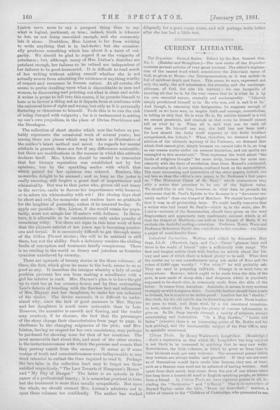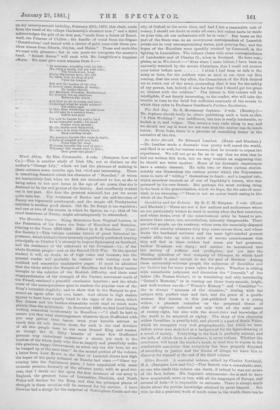Ultima Thule. By Henry Wadsworth Longfellow. (Routledge.) —Such a reputation
as that which Mr. Longfellow has long enjoyed is not likely to be increased by anything that he may now write. Nevertheless, the little volumes, iu which he gives us from time to time his latest work, are very welcome. The occasional poems which they contain are always tender and graceful. If they are not such as of themselves would have made him famous, they are, at least, such as a famous man need not be ashamed of having written. And apart from their merit, they come from the pen of one whose name has long been a household word to English-speaking people, as letters from a friend. In Ultima Thule we have eighteen poems in all, in- cluding the "Dedication " and " L'Envoi." One is in memoriam of Bayard Taylor, under the title, "From my Arm-chair ;" another, a letter of thanks to the " Children of Cambridge, who presented to me, on my seventy-second birthday, February 27th, 1879, this chair, made from the wood of the village blacksmith's chestnut tree ;" and a third acknowledges the gift of an iron pen, "made from a fetter of Bonni- yard, the Prisoner of Chinon ; the handle of wood from the frigate Constitution,' and bound with a circlet of gold, inset with three pre- cious stones from Siberia, Ceylon, and Maine." These and such-like we read with pleasure ; but in one poem we recognise the master's hand. "Robert Burns." will rank with Mr. Longfellow's happiest efforts. We must give some stanzas from it :- " At moments, wrestling with his fate ;
His voice ie harsh, but not with bate ; The brush-wood, hung Above the tavern door, lets fall Its bitter leaf, its drop of gall Upon his tongue.
But still the burden of his song Is love of right, disdain of wrong ; Its master-chords Are Manhood, Freedom, Brotherhood, Its discords but an interlude Between the words.
And then to die so young and leave fintluishod what ha might achieve! Yet better sure is this, than wandering up and down An old man in a country town, Infirm and poor.
For now ho haunts his native land As an immortal youth ; his baud
Guides every plough ; He sits beside each inglo-nook, His voice is in each rushing brook Each rustling bough.
His presence haunts this room to-night, A form of mingled mist and light, From that far coast.
Welcome beneath this roof of mine! Welcome! this vacant chair is thine, Dear guest and ghost!"
: . .







































 Previous page
Previous page